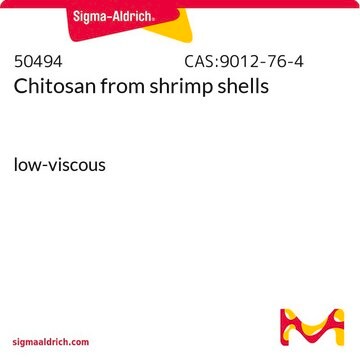417963
Chitosan
from shrimp shells, practical grade
Synonyme(s) :
Deacetylated chitin, Poly(D-glucosamine)
About This Item
Produits recommandés
Source biologique
shrimp shells
Qualité
practical grade
Forme
solid
Poids mol.
190000-375000 Da
Viscosité
>200 cP, 1 wt. % in 1% acetic acid(20 °C, Brookfield)(lit.)
Solubilité
1 M acetic acid: 10 mg/mL
InChI
1S/C56H103N9O39/c1-87-56(86)65-28-38(84)46(19(10-74)96-55(28)104-45-18(9-73)95-49(27(64)37(45)83)97-39-12(3-67)88-47(85)20(57)31(39)77)103-54-26(63)36(82)44(17(8-72)94-54)102-53-25(62)35(81)43(16(7-71)93-53)101-52-24(61)34(80)42(15(6-70)92-52)100-51-23(60)33(79)41(14(5-69)91-51)99-50-22(59)32(78)40(13(4-68)90-50)98-48-21(58)30(76)29(75)11(2-66)89-48/h11-55,66-85H,2-10,57-64H2,1H3,(H,65,86)/t11-,12-,13-,14-,15-,16-,17-,18-,19-,20-,21-,22-,23-,24-,25-,26-,27-,28-,29-,30-,31-,32-,33-,34-,35-,36-,37-,38-,39-,40-,41-,42-,43-,44-,45-,46-,47-,48+,49+,50+,51+,52+,53+,54+,55+/m1/s1
Clé InChI
FLASNYPZGWUPSU-SICDJOISSA-N
Vous recherchez des produits similaires ? Visite Guide de comparaison des produits
Catégories apparentées
Application
Caractéristiques et avantages
Forme physique
Code de la classe de stockage
11 - Combustible Solids
Classe de danger pour l'eau (WGK)
nwg
Point d'éclair (°F)
Not applicable
Point d'éclair (°C)
Not applicable
Équipement de protection individuelle
Eyeshields, Gloves, type N95 (US)
Certificats d'analyse (COA)
Recherchez un Certificats d'analyse (COA) en saisissant le numéro de lot du produit. Les numéros de lot figurent sur l'étiquette du produit après les mots "Lot" ou "Batch".
Déjà en possession de ce produit ?
Retrouvez la documentation relative aux produits que vous avez récemment achetés dans la Bibliothèque de documents.
Articles
Chitin, a natural polysaccharide, is the second most abundant natural biopolymer in the world, after cellulose.
Carcinogenic compounds in elastomers: 1,3-butadiene and isoprene used in elastomer manufacturing, classified as carcinogenic by IARC.
Polymers, natural or synthetic, are vital in medical advancements, contributing to device and pharmaceutical development in therapy.
Notre équipe de scientifiques dispose d'une expérience dans tous les secteurs de la recherche, notamment en sciences de la vie, science des matériaux, synthèse chimique, chromatographie, analyse et dans de nombreux autres domaines..
Contacter notre Service technique



